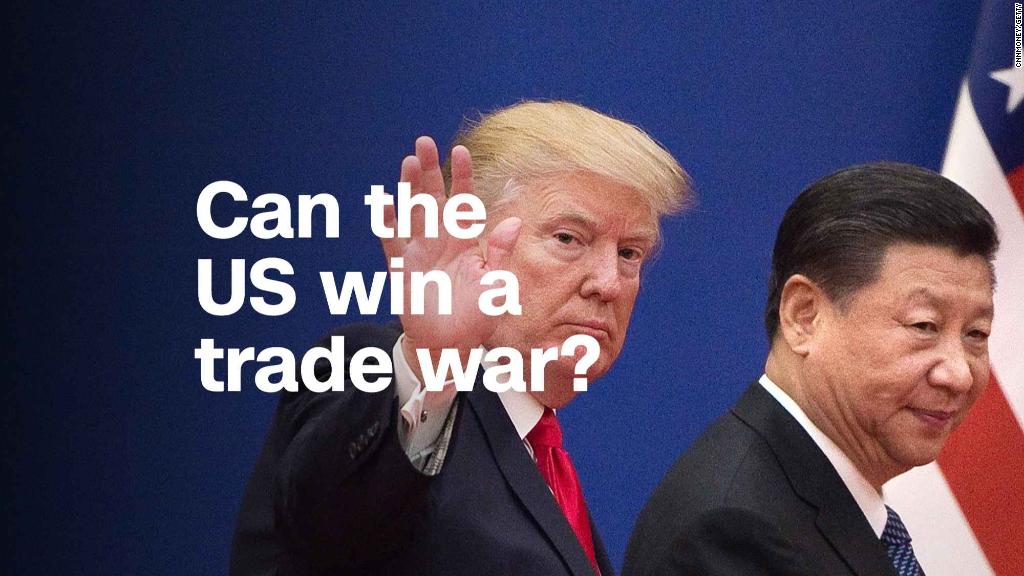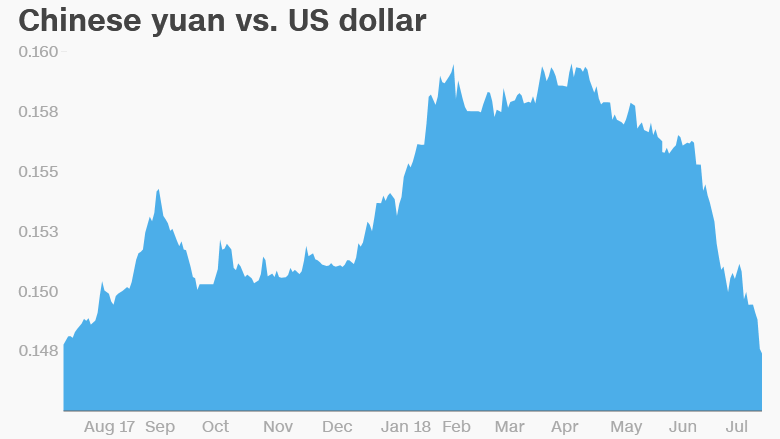
China's currency is plunging again. But how low will it go?
The yuan weakened by nearly 1% against the US dollar on Thursday and continued its slide Friday, hitting its lowest level in over a year. It has now fallen by more than 8% over the past three months amid a global trade spat and concerns over an economic slowdown in China.
Analysts said the yuan's latest dip came after China's central bank indicated that it was willing to accept a weaker currency.
A sliding currency could help China's huge export industry cope with new US tariffs, as it makes Chinese products cheaper for buyers who pay in dollars. That could in turn boost an economy that posted its slowest growth rate in nearly two years — 6.7% — in the second quarter.
Unlike the dollar or euro, the yuan does not float freely against other currencies. Instead, China's central bank — the People's Bank of China — helps guide the currency by setting a daily trading range.
Analysts at research firm BMI noted Friday that the yuan is weakening because investors expect the bank to loosen monetary policy "in a bid to support an economy that is facing multiple headwinds," including a trade war with the United States.
Related: China's yuan is weakening against the dollar. Here's what's going on

The United States and China have slapped tariffs on billions of dollars of each other's goods, and President Donald Trump is threatening to strike again at even more Chinese exports.
A weaker yuan risks increasing trade tensions with the Trump administration, which has repeatedly accused China of keeping its currency artificially low to support its huge export industry.
The latest declines prompted Trump to complain in an interview with CNBC on Thursday that the yuan was "dropping like a rock" against the dollar.
"Our currency is going up. I have to tell you, it puts us at a disadvantage," Trump added.
Analysts say it's unlikely that China would use the weaker yuan as a weapon in the trade war. They point to the chaos caused in Chinese and global markets by sharp falls in the currency in 2015 and 2016.
"Whether or not China is wittingly undertaking a depreciation policy, the question will increasingly be on investors' minds as the slide deepens," Societe Generale strategists wrote in a note on Friday.
Related: China's economy shows signs of slowing. A trade war won't help
There are other factors weighing on the yuan. Given the strength of the US economy, the Federal Reserve is expected to keep raising interest rates. That makes it more attractive for investors to hold US dollars, prompting them to sell other currencies.
"Gravity is doing its job again as monetary policy diverges further between the United States and China," said Margaret Yang, an analyst at investment firm CMC Markets.
The question is how much further the yuan may fall.
Qi Gao, a currency analyst at Scotia Bank, expects the currency to weaken almost another 2% against the dollar. That would be when it would feel compelled to halt the yuan's descent, he added.
It's a careful balancing act for policymakers.
If the yuan falls too quickly, it could prompt money to flood out of China as investors lose confidence and seek to exchange it for assets in dollars and other currencies.
"Chinese authorities will likely prevent the currency from moving too sharply in any direction," said Hannah Anderson, global market strategist at JPMorgan Asset Management.


